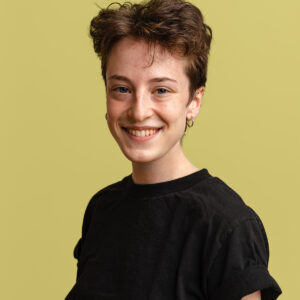Welcome to Dear Jewish Queeries, an advice column by and for Queer Jews through New Voices Magazine! You can submit your own questions for queer Jewish advice by clicking here. Stay tuned – your question may be chosen by our columnists.
How do I balance autonomy/individuality and togetherness/connection in a romantic relationship where Judaism is really important to one partner (spiritually, in identity, and in practice, including observing Shabbat more traditionally) and the other partner is a die-hard atheist? It’s also hard to find common ground in any discussion about religion.
This is an excellent question with a lot more layers than you think. Let’s break it down to its core elements.
Respect
The first element I want to address is what seems like a throwaway line at the end of this question: “It’s also hard to find common ground in any discussion about religion.”
When you think about the discussions you’re having, ask yourself a few questions. Are they friendly? Whether or not the people talking come from a place of mutual respect is central to the direction of the conversation as a whole. When people respect each other, the desire for a discussion about significant topics like spirituality comes from a natural place of curiosity about the other person. The exchange is ultimately not about being right or winning — it’s about gaining a better understanding of someone you care about.
If you feel these conversations are coming from a place of wanting to put you down or if you don’t feel respected or heard, you might want to stop here and re-evaluate the question you initially asked. If mutual respect isn’t present in any discussions you’re having, you instead need to ask yourself if this relationship is a healthy one.
If these talks are coming from a genuine desire to understand one another, read on.
Spiritual Alignment
Point blank: do you need to agree on religion with your partner to be happy in a relationship? There’s no right answer, but your response determines how to proceed. As is demonstrated by your question, religion and spirituality are deeply personal and unique. Differing viewpoints on this topic can’t always be talked out to mutual agreement. If sharing religious beliefs and practices is necessary, you’re again left with the task of deciding if this relationship is right for you.
If spiritual differences are okay with you, let’s figure out how to navigate that. A good place to start might be asking yourself how involved you want your partner to be in your religious observance or to what degree can you engage with your partner’s observance. This could range from doing rituals like lighting Shabbos candles together and celebrating holidays to text study or discussing the meaning of holidays. Identifying these practices and then doing them are, of course, much easier said than done.
Differing religious observance in relationships often leads to a jumble of dynamics, even in best case scenarios. I’ve been on both sides of this situation in previous relationships, where I am either the more observant or only Jewish partner, or my partner is more observant than me. Never have I been in any relationship where spirituality was truly matched. You wouldn’t find this if you randomly selected two Jews walking down the street. There’s a reason “two Jews, three opinions” is an expression, so don’t feel bad about it.
In this situation, it’s pretty common for all partners to feel pressure. For a nonreligious or less observant partner, this can manifest in an anxiety about doing rituals right or fear of messing up. There’s also the added anxiety from doing something you’re unfamiliar with. When it comes to ritual practice in this context, it can feel like there’s more at stake.
When someone is unfamiliar or hesitant to engage with ritual, it can also affect the observant partner who may struggle with the feeling that their ritual is foolish or that they’re dragging their partner into something. Even with their partner’s participation, it can be easy for the observant partner to feel isolated or wish to be around someone who gets it.
Being queer and Jewish
I would say that queer Jews are overfamiliar with complicated romantic scenarios. In your situation, who you are is a strength. Queer people often have to go out of our way to find family when biological family doesn’t meet our needs. As a result, queer people are well-known for relying on complex networks of friends and lovers for support. It seems queer Jews are especially good at finding and maintaining these connections, as evidenced by number of times I discover I’m mutual friends with seemingly random gay Jews I meet.
It may be helpful to take a similar approach to your religious observance. Ritual that’s done with friends or platonically is no less sacred than what you’d do with a significant other. Both people in this situation can lean into friendship and community to find others who share their beliefs.
Being queer and Jewish can also make this uniquely difficult, as not every Jewish community is hospitible to queer people and vice versa. I know I’m not the only queer person who’s found myself reluctant to challenge something in a relationship because I’ve idealized it. Being queer is so often isolating on its own that when we find a partner, we’re too scared of losing the connection to be healthily critical of it. If both partners are also Jewish, this sense of “false scarcity” can be further heightened. It’s this initial fear of being alone that leads people to stay in dysfunctional relationships. Thankfully, the identities that lead to this scarcity mentality are its antidote. It isn’t necessary to put pressure on either of you to match every belief or need when we have friends and other community members to step in. More often than not, relationships that begin as ways to fill gaps turn into meaningful support systems.
Ultimately, don’t let who you are prevent you from asking hard questions, having difficult conversations, and being clear about what you want. You’ve made it clear from the question that both you and your partner are grounded in your respective beliefs. Lead with your knowledge of yourself and your needs. You may find yourself with new traditions, a larger community, and perspectives on observance you may not have considered before. Trust the parts of yourself that brought you to this moment, and you’ll find you can rely on them to guide you through it.
Need advice? You can submit your own questions for Dear Jewish Queeries by clicking here.

